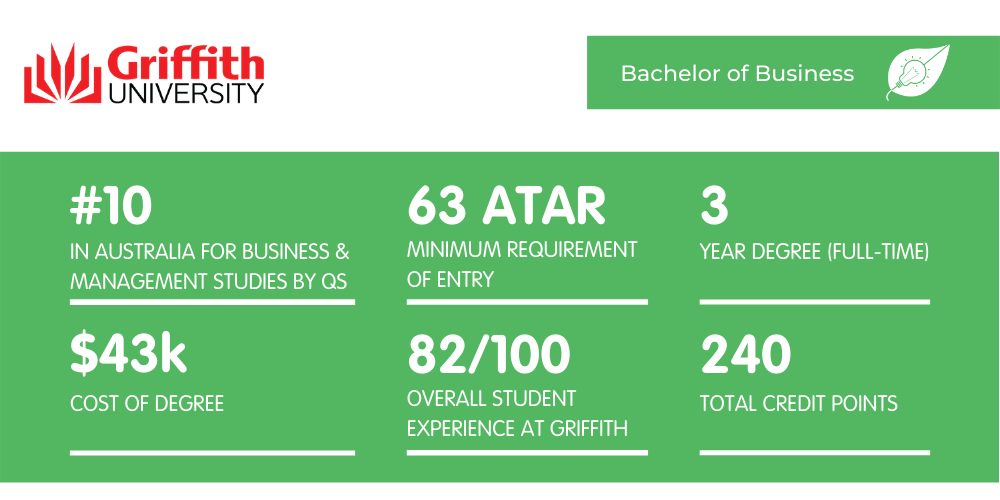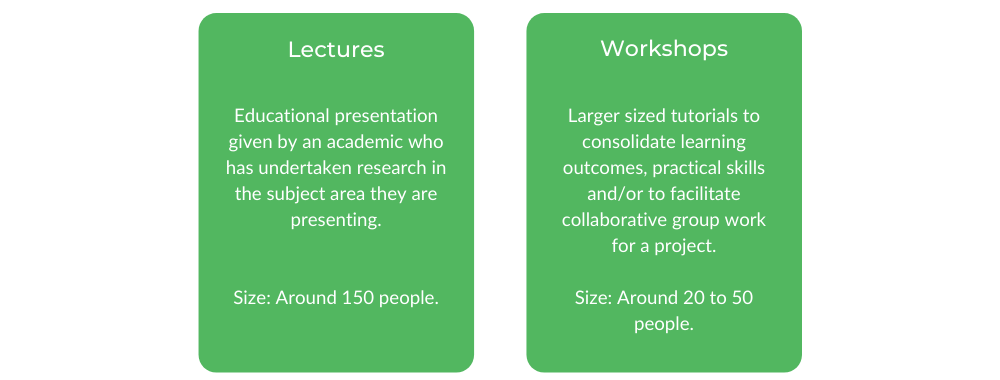Planning to do a Bachelor of Business, but there’s too many to choose from or perhaps, you want to study in Queensland? Then, consider a Bachelor of Business at Griffith University!
In this article, we’ll give you the low-down on what studying a Bachelor of Business at Griffith University is all about — from the core units and majors to the societies you could join.
Let’s dive in!
What is a Bachelor of Business at Griffith University?
Core Units and Majors
How to Get into a Bachelor of Business at Griffith University
What’s the Teaching Format?
What’s the Faculty and Culture Like?
What is a Bachelor of Business at Griffith University?
A Bachelor of Business at Griffith University teaches the traditional and new business practices in the twentieth-century economy. Recently redesigned in 2021, the degree provides more than 20 majors for students to choose from and has a new awareness for business in the Australasian region!
The degree does not need to be studied with another degree or as Honours. However, if you wish to diversify your career opportunities, the degree can be studied as a double degree with:
-
- Bachelor of Arts
- Bachelor of Data Science
- Bachelor of Government and International Relations
- Bachelor of Communication and Journalism
- Bachelor of Design
- Bachelor of Engineering (Honours)
- Bachelor of Exercise Science
- Bachelor of Environmental Science
- Bachelor of Information Technology
- Bachelor of International Tourism and Hotel Management
- Bachelor of Laws (Honours)
- Bachelor of Psychological Science
- Bachelor of Science
- Bachelor of Sport Development
- Bachelor of Visual Arts
After completion of their second year, Business students can also apply for an Honours program if they have achieved a minimum Grade Point Average (GPA) of 5.0.
Career Paths
While a Bachelor of Business provides highly transferable skills, students typically look for career pathways in the chosen major(s).
For example, Taxation majors can work as Tax Agents or Financial Advisers for banking firms and consultancies. On the other hand, International Business majors can work as Global operations directors or Strategic planners.
Across the various business sectors, you might find yourself in a career such as:
-
- Business analyst
- Human resources manager
- Media liaison
- Corporate researcher
- Marketing manager
- Sustainability adviser
…and the list just goes on!
Core Units and Majors
What are the Core Units?
The core units for all Business students are completed in the first year of the degree. The six core units are:
These units provide the context of why and how business is studied.
Why Money Matters outlines the individual and macro importance of financial literacy, while introducing topics such as financial markets and fintech. Engaging Australia and the Asia-Pacific serves like a crash-course into Asia’s history, the current Australia-Asia relationship and the future of Australasian business.
Majors/Specialisations
After the first year of studying core units, Business students are provided flexible study options for their second and third year. They may choose to study two majors, one major, one minor and electives, one major and the rest as electives, or study electives solely.
There are 35 majors for Business students (the full list can be found here) and includes:
-
- Accounting (Extended)
- Management
- Economics
- Finance
- Taxation
- International Business (Extended)
What are some of the majors like?
An Accounting (Extended) major comes from the Commerce suite of the Business degree and students are taught quantitative financial methods and reporting, corporate finance as well as laws associated with taxation and business. By the end of their degree, students majoring in Accounting (Extended) may be eligible to join the Association of Chartered Certified Accountants (ACCA).
Students with a Finance major are taught analysis and projection methods, planning, and the management of investments, portfolios and general finance. This major is also from the Commerce suite of the Business degree.
Studying an International Business (Extended) major encompasses topics such as international trade, global business and the strategy of trade on an international level. Near the end of their major, students majoring in International Business (Extended) complete a capstone unit where student teams tackle a real-world problem set by industry clients.
However, at Griffith University, there are no mandatory built-in internships in a Bachelor of Business.
How to Get into a Bachelor of Business at Griffith University
The ATAR cut-off for entry into a Bachelor of Business at Griffith University is 63.
If your ATAR does not meet the cut-off, an alternative pathway is to complete an AQF Certificate III, which is part of the Vocational Education and Training (VET) qualification that guarantees admission to a Bachelor of Business.
Assumed Knowledge
While there are no additional assessments to study a Bachelor of Business, the assumed knowledge is any two units of English.
Scholarships
If you decide to study a Bachelor of Business at Griffith, some scholarships may be available for you!
The George Alexander Foundation Scholarship offers a maximum value of $24,000 for commencing students who need to move away from home to study at Griffith; this takes into account your ATAR (must be 80 or above), leadership and community experience, and your personal statement.
Similarly, the Chancellor’s Scholarships provides a maximum value of $22,000 for commencing students experiencing financial disadvantage.
What’s the Teaching Format?
At Griffith University, a Bachelor of Business is studied in trimesters and it is typically taught in a combination of lectures and workshops.
Class Structure
Lectures
Class sizes for lectures vary on whether it is a core or major unit; however, for first-year core units, lectures have roughly 150 students and are around 45 minutes long. Students are taught the weekly topic material.
Though the main focus is on the lecturer, Griffith lectures make sure that there is also opportunity to ask general questions on the areas of the material that they did not fully comprehend.
Workshops
Also depending on the unit, workshop class sizes vary and can range from 20 to 50 students attending. They can be 45 minutes to 2 hours long.
Workshops are quite similar to tutorials; student participation is focused on in workshops, and working on case studies and hypothetical problems are ways to reconsolidate the lecture material. For example, a workshop for a Finance major can include practising the auditing of general financial reports.
How much time do you spend on campus?
Generally, Business students will have 12-15 contact hours per week.
Assessments
The main assessment types for a Bachelor of Business are written assignments, quizzes and examinations. The balance between the three assessment types varies on the units and the chosen major.
Written assessments, such as written reports and reflective essays, come up for theory-based units, where students are assessed on their strategic skills and comprehension of the content. They can weigh from 15-50% of the unit grade!
Online or in-class quizzes are given either mid-semester or weekly. Quizzes are to make sure that students are on top of the unit content and are usually multiple-choice! They are around 15-20% of the unit grade.
Final exams are typically open-book exams where students provide written responses to scenarios. Students are assessed on their theoretical knowledge, critical analysis and practical abilities in hypothetical settings. They are usually 30-35% of the unit-grade.
Skills That You Refine and Learn
At Griffith, the core of a Bachelor of Business is learning to adapt to an ever-changing economy and business environment.
For Business graduates, their strategic skills are developed through the application of theoretical knowledge to hypothetical situations, both in workshops and assessments. This may include analysis of financial projections or strategies in the prevention of workplace conflict.
At the end of their degree, Business graduates accumulate a wealth of technical knowledge in their chosen major, which they transfer to a professional setting. For example, graduates with a major in Finance gain a competitive edge to entry-level roles, such as financial analysts.
Communication, in both written and verbal form, are developed throughout the rigour of written assessments, class discussion and understanding specific jargon. Business graduates will have learned to communicate their ideas and strategies, and how to appropriately direct their communication at different audiences.
What’s the Faculty and Culture Like?
Faculty
All staff at the Business School ultimately want to see their students not just pass, but succeed in their units.
“The Business School in Griffith is great. I am so glad I joined the Business School — not only are the staff very kind, they try to the best of their ability to answer any of my questions.” — Nelleka Toomalatai
For peer friendships, it’s recommended that you join the Griffith Business School Student Leadership Program.
“This program has been a great deal for me. Since joining, I was able to be in the frontline of student feedback and have met great friends who I now call family.” — Nelleka Toomalatai
Culture
At Griffith University, there is a strong society culture with over 120 societies and clubs on the Brisbane campus. The Griffith Business Students Association (GBSA) is a great society for any Business student; the association offers events such as Industry Insights, Business Balls and Trivia Nights.
There are also many special-interest societies for different types of Business majors, including the Griffith Employment Relations and Human Resources Management Society, Marketing Club, Tourism and Hospitality Club and the Commerce Society.
Keen to know more? Check out the pros and cons of a Bachelor of Business at Griffith here!
Lynn Chen is a Content Writer at Art of Smart Education and is a Communication student at UTS with a major in Creative Writing. Lynn’s articles have been published in Vertigo, The Comma, and Shut Up and Go. In her spare time, she also writes poetry.






